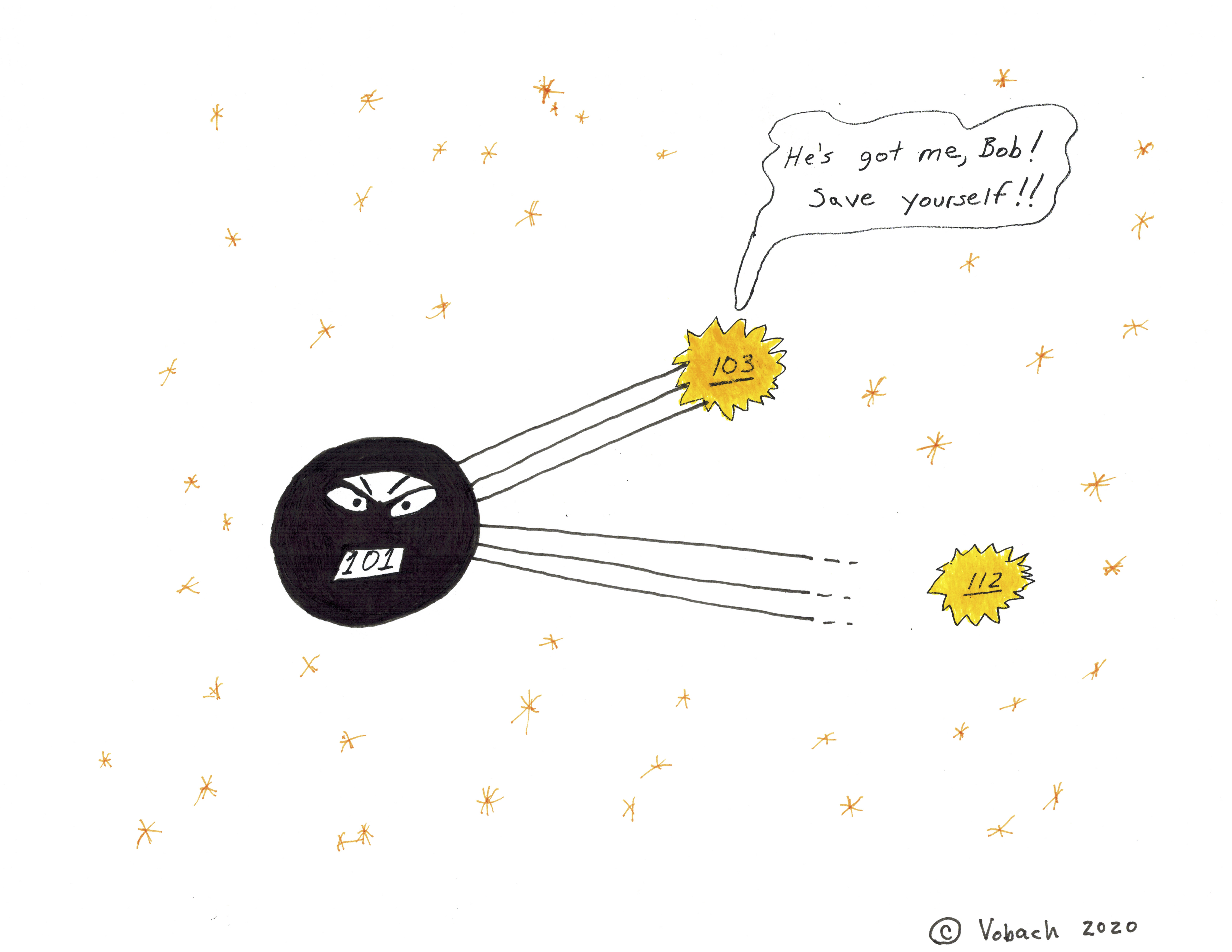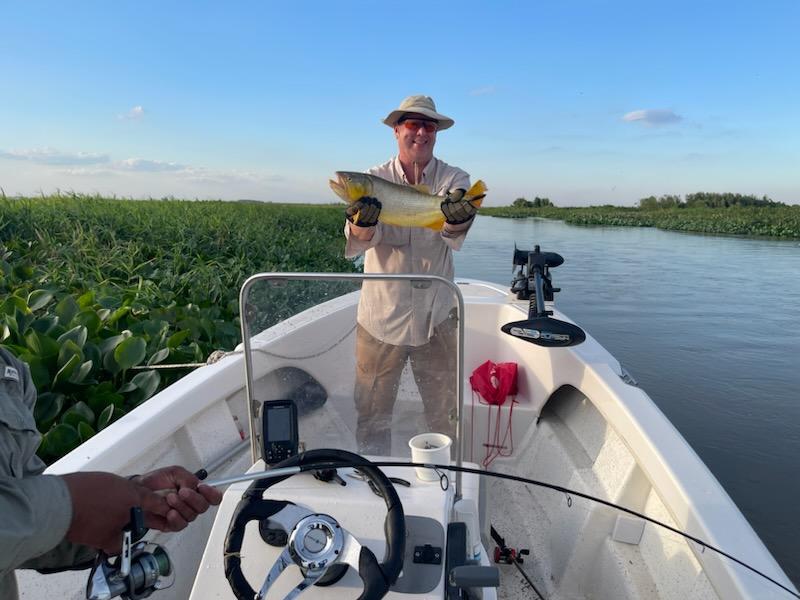by Bill Vobach
I ran this cartoon1 back in 2020; but, I thought today might be a good day to run it again [Link].

- Not drawn to scale. ↩︎
There were some fun audio bites in the oral argument of CR BARD, INC. v. Medical Components, Inc., No. 2022-1136 (Fed. Cir. Feb. 17, 2023).
Judge Hughes had some frank comments about the court injecting printed matter into patent eligibility determinations:
You can listen to the entire oral argument here:
I saw a blurb yesterday in IPLaw360 that highlighted an appeal from a Fifth Circuit case that will be heard by the Supreme Court next term. The case is Jarkesy v. SEC, 34 F.4th 446 (5th Cir. 2022).
Some of the issues raised in the oral argument at the Fifth Circuit are somewhat related to those that were raised in the Arthrex and Oil States decisions. The Oil States decision is also discussed in the briefing to the Supreme Court, as well as in the dissenting opinion at the Fifth Circuit.
You can listen to the Fifth Circuit oral argument here:
The issues presented in the appeal to the Supreme Court are:
QUESTIONS PRESENTED
- Whether statutory provisions that empower the
Securities and Exchange Commission (SEC) to initiate
and adjudicate administrative enforcement proceedings
seeking civil penalties violate the Seventh Amendment.- Whether statutory provisions that authorize the
SEC to choose to enforce the securities laws through an
agency adjudication instead of filing a district court ac-
tion violate the nondelegation doctrine.- Whether Congress violated Article II by granting
for-cause removal protection to administrative law
judges in agencies whose heads enjoy for-cause removal
protection.
The oral argument of the day is from LKQ CORPORATION v. GM GLOBAL TECHNOLOGY OPERATIONS LLC, No. 2021-2348 (Fed. Cir. Jan. 20, 2023). The Federal Circuit recently granted en banc review in this case.
I am listing a second oral argument, as well, as there was a companion case argued immediately following the 2021-2348 oral argument. I thought some people might find it interesting.
When argued, the en banc argument should feature Judge Clevenger. While he is a senior judge, he was part of the original panel. So, he is entitled to participate in the en banc decision with the full-time members of the court — although, I believe the Federal Circuit changed its procedures in recent years so that senior judges on the original panel are no longer allowed to vote in determining whether to take a case en banc. Judge Clevenger authored the “Durling” decision in 1996. In the original 2021-2348 panel decision, the “Rosen” and “Durling” tests are discussed.
We all have probably encountered an obviousness argument that cobbled together references in an unconvincing manner. In this earlier post, such a combination was aptly described as a Frankenstein combination.
I was trying to think of some other phrases that the Federal Circuit could use in future opinions to describe such combinations of features/elements/limitations/references. Here are a few suggestions:
a chaotic bricolage
an omnium gatherum
a wishful patchwork
a cacophonous medley
an unpalatable goulash
a conglomeration abomination
an unfettered quilt
a motley melange
a concocted Chimera
a chimeric concoction
a synthetic snarl
an incongruous union
a monster mishmash
That society should protect, and thereby stimulate, investment in innovation—not just invention—has been held by many; but few were as consistent in their conclusions as Joseph A. Schumpeter, who on these grounds favored permitting monopolistic practices of various sorts. He argued that temporary security from competition, through cartels, patents, or other restraints, would encourage firms to put more venture capital into innovating investment. Schumpeter, Capitalism, Socialism, and Democracy (New York: Harper, 1942), pp. 81-106.
“An Economic Review of the Patent System,” Fritz Machlup, United States Government Printing Office 1958, page 9, footnote 44.
The Supreme Court has granted cert. in Loper Bright Enterprises v. Raimondo. The issue in that case is:
Whether the court should overrule Chevron v. Natural Resources Defense Council, or at least clarify that statutory silence concerning controversial powers expressly but narrowly granted elsewhere in the statute does not constitute an ambiguity requiring deference to the agency.
An interesting article would be one that considers how overruling of Chevron would impact patent law. Would the current make-up of the Federal Circuit be a better or worse choice in deciding historically Chevron issues, as opposed to deference to administrative officials at the USPTO?
This quiz question concerns a situation where one of the three judges of a Federal Circuit panel dissents from the two judge majority opinion. Which of these answers is/are correct for designating the opinion precedential:
Judges Taranto and Newman pressed an issue during a recent oral argument as to who is the real party in interest when a membership organization brings an IPR. The importance in deciding the issue is that it affects how estoppel applies during future district court litigation (at least) for that patent. Should the estoppel apply just to the membership entity itself or should it also apply to the members of the membership entity? Should it apply to only the members who fund the IPR?
From Judge Newman’s and Judge Taranto’s comments, apparently this is an issue that is percolating now in the courts. So, look for more to come from the courts on this issue.
The oral argument was in the recently decided Rule 36 Judgment in VILOX TECHNOLOGIES, LLC v. UNIFIED PATENTS, LLC, No. 2019-2057 (Fed. Cir. Feb. 14, 2023). [Opinion]. The court ultimately didn’t reach the issue in this case because the patent at issue was affirmed as invalid — thus it won’t be asserted in future litigation and estoppel won’t be an issue.
The entire oral argument is available for download here: [Link]. However, the pertinent discussion concerning who is the real party in interest when a membership organization brings an IPR is available here:
I was down in Argentina earlier this month and had the opportunity to do some fishing for a fish known as the Golden Dorado (a.k.a., ‘El Tigre del Rio’). While I was a patent attorney literally on a fishing expedition, it was not the same type that the Federal Circuit was referring to in Monarch Assur. PLC v. US, 244 F.3d 1356 (Fed. Cir. 2001):
Having said that, we wish to make clear to plaintiffs and their counsel that the trial court is not expected to, nor should it, simply allow plaintiffs to embark on a wide-ranging fishing expedition in hopes that there may be gold out there somewhere, or worse, in hopes that the Government will get tired of litigating and settle an otherwise unprovable case.
Monarch Assur. PLC v. US, 244 F.3d 1356, 1365 (Fed. Cir. 2001).

Judge Wallach took senior status back in 2021. In the final oral argument over which he presided, he thanked the bar for its courtesy and hard work over the years. You can listen to his sign-off here:
There was another interesting sound bite during that oral argument. In an appeal from Judge Albright’s courtroom, Judge Wallach asked whether a person of skill in the art was a district court judge with twenty years of patent litigation experience:
You can listen to that entire oral argument here:
Whether something is well-understood, routine, and conventional to a skilled artisan at the time of the patent is a factual determination. Whether a particular technology is well-understood, routine, and conventional goes beyond what was simply known in the prior art. The mere fact that something is disclosed in a piece of prior art, for example, does not mean it was well-understood, routine, and conventional.
Berkheimer v. HP INC., No. 2017-1437 (Fed. Cir. Feb. 8, 2018)(slip opinion at 14).
An examiner’s assertion that a particular fact or principle is well-known is not evidentiary support. Arendi S.A.R.L. v. Apple Inc., 832 F.3d 1355, 1362 (Fed. Cir. 2016).
In re Google, 2022-2012 (Fed. Cir. January 9, 2023)(slip opinion at 10 citing Arendi S.A.R.L. v. Apple Inc., 832 F.3d 1355, 1362 (Fed. Cir. 2016) and DyStar Textilfarben GmbH & Co. Deutschland KG v. C.H. Patrick Co., 464 F.3d 1356, 1367 (Fed. Cir. 2006).
Sure sounds like the PTO should be required to provide evidence in a §101 rejection that something is well-understood, routine, and conventional to a skilled artisan at the time of the patent — not mere examiner or APJ opinions — or otherwise the rejection should fail for lack of substantial evidence.
by Bill Vobach
The recent appropriations Act makes provisions for a new satellite patent office in the Southeast Region of the United States. The new office will be located in one of these states within the next three years: Virginia, North Carolina, South Carolina, Georgia, Florida, Tennessee, Alabama, Mississippi, Louisiana, and Arkansas.
So, where will it end up? I suppose the most logical place for the satellite office is the Research Triangle area of North Carolina; but, that’s open to debate. Criteria for assessing where to locate the new office will include:
(A) The number of patent-intensive industries located near the site.
(B) How many research-intensive institutions, including institutions of higher education, are located near the site.
(C) The State and local government legal and business frameworks that support intellectual property-intensive industries located near the site.
At any rate, it will be interesting to see where the ultimate location will be. Personally, I’m pulling for Florida.
Here’s the pertinent text from the Act:
(b) Southeast Regional Office.–
(1) In general.–Not later than 3 years after the date of
enactment of this Act, the Director shall establish a satellite
office of the Office in the southeast region of the United States.
(2) Considerations.–When selecting a site for the office
required under paragraph (1), the Director shall consider the
following:
(A) The number of patent-intensive industries located near
the site.
(B) How many research-intensive institutions, including
institutions of higher education, are located near the site.
(C) The State and local government legal and business
frameworks that support intellectual property-intensive
industries located near the site.
The audio bite of the day comes from Judge Moore during the oral argument of ADASA INC. v. AVERY DENNISON CORPORATION, No. 2022-1092 (Fed. Cir. Dec. 16, 2022).
I think you may be the only person I’ve ever heard . . . say that we have somehow created bright lines in 101. I can’t think of anything that’s further from the truth.
Chief Judge Moore, Oral Argument in ADASA INC. v. AVERY DENNISON CORPORATION, No. 2022-1092 (Fed. Cir. Dec. 16, 2022) at 00:34.